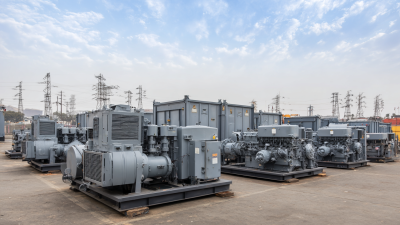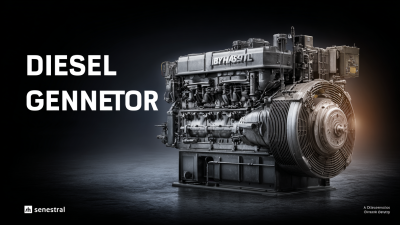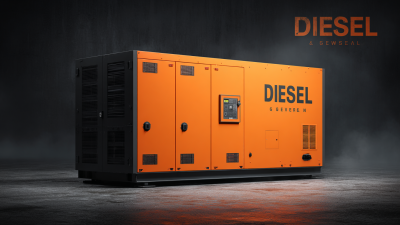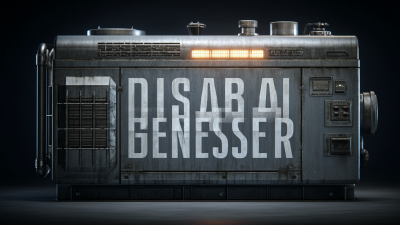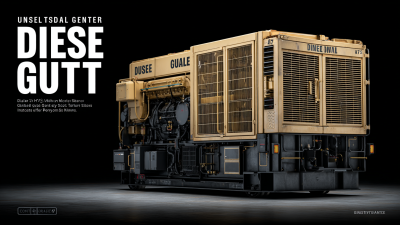
-
Home
-
Products
-
Service
-
About Us
-
Solution
-
Videos
-
News
-
Contact Us
Leave Your Message

In today's world, where power reliability is paramount for both residential and commercial applications, selecting the right Standby Diesel Generator is crucial. According to a recent report by Global Industry Analysts, the global market for diesel generators is projected to surpass $21 billion by 2026, driven by the increasing demand for uninterrupted power supply. This growth is particularly evident in sectors such as healthcare, data centers, and manufacturing, where any downtime can result in significant financial losses and operational disruptions. As businesses and homeowners seek to safeguard their energy needs, understanding the key factors in choosing a standby diesel generator becomes essential. This blog will explore five essential tips to help you make an informed decision, ensuring that you select a generator that meets your specific power requirements, budget considerations, and long-term energy strategies.

When selecting a standby diesel generator, understanding your power needs and load requirements is crucial for ensuring reliable performance during outages. The first step is to calculate your total power demand, which includes the wattage of all essential appliances and equipment you wish to run simultaneously. Consider both starting and running wattages, as many devices require extra power—typically 2-3 times their running wattage—when they first turn on. This comprehensive assessment helps in selecting a generator that can handle peak loads without straining its capacity.
Next, consider the type of load your generator will support. Are you powering sensitive electronics or heavy machinery? For sensitive devices, you'll need a generator with advanced features like voltage regulation and a stable power output to prevent damage. On the other hand, if your load consists mainly of inductive devices or heavy machinery, look for a generator designed to efficiently manage these types of loads. By understanding both the total power requirements and the nature of your loads, you can ensure that your standby diesel generator will provide reliable power whenever you need it.
When evaluating diesel generators, understanding the fuel source and efficiency is crucial for optimal performance, especially under varying environmental conditions. According to a study on the effects of low charge and environmental conditions on diesel generator operations, generators can experience significant variations in performance when operating at less than optimal charge levels. This can lead to increased fuel consumption and emissions, making it essential to consider the working load and surrounding climate when selecting a generator.
Additionally, an economic and environmental assessment of different energy storage methods highlights the necessity for efficient hybrid systems that incorporate diesel generators alongside renewable sources. Integrating diesel generators with battery energy storage systems (BES) and photovoltaic panels has shown to enhance overall efficiency, thereby reducing dependency on fossil fuels. The techno-economic analysis indicates that such hybrid solutions not only improve fuel efficiency but also contribute to lower greenhouse gas emissions, aligning with global sustainability goals. This dual approach assures a reliable power supply while minimizing the adverse impacts of diesel fuel usage, making it an important consideration for consumers and industries alike.

When choosing a standby diesel generator, assessing noise levels and environmental compliance standards is crucial for ensuring that your selection aligns with current regulations and community expectations. High noise levels generated by diesel generators can lead to significant disturbances, contributing to overall environmental noise pollution. This is particularly important in urban areas and residential neighborhoods, where noise complaints can arise, affecting both community relations and property values.
To mitigate potential noise issues, consider generators equipped with advanced noise-reducing technology or soundproof enclosures. Additionally, evaluating the generator's compliance with environmental regulations is key. Many regions enforce strict noise limits and emissions standards to reduce the impact of machinery on local ecosystems and public health. Keeping up-to-date with regulatory changes will not only ensure compliance but also promote a more sustainable and community-friendly operation, as the emphasis on minimizing environmental footprints grows. Prioritizing these factors will help you make an informed decision when selecting the right standby diesel generator for your needs.
| Criteria | Description | Recommended Level |
|---|---|---|
| Noise Level | Measure the decibel level of the generator during operation. | Below 70 dB(A) for residential areas |
| Emissions Compliance | Ensure the generator meets EPA or local emissions standards. | EPA Tier 4 compliant |
| Fuel Efficiency | Evaluate the fuel consumption rate in gallons/hour. | Above 0.4 Gallons/kWh |
| Run Time | Assess how long the generator can run on a full tank. | Minimum 8 hours at full load |
| Maintenance Requirements | Understand how often the generator needs servicing. | Every 200 hours or as specified |
When selecting a standby diesel generator, understanding maintenance and support options is crucial for ensuring its longevity and reliability. According to a report by the International Energy Agency, proper maintenance can extend the operational life of diesel generators by up to 30%. This means that investing in a generator with accessible and comprehensive maintenance support can ultimately save you substantial costs over its lifetime.
It is essential to evaluate the manufacturer's maintenance offerings, including the availability of parts and response times for servicing. A study by the Diesel Generator Maintenance Association revealed that organizations with robust preventive maintenance programs experience 20% fewer unplanned outages compared to those that do not prioritize maintenance. Furthermore, consider the training resources available for your team, as well-prepared staff can significantly reduce downtime by efficiently handling minor repairs and routine checks. Prioritizing these factors will ensure your standby diesel generator operates effectively when you need it most.

When selecting a standby diesel generator, it’s crucial to consider not just the initial purchase price, but also the total cost of ownership (TCO). This includes ongoing maintenance, fuel costs, and potential repair expenses over the generator’s lifespan. Understanding these factors will help you make a more informed decision that fits your budget constraints.
One essential tip is to evaluate fuel efficiency. A generator that consumes less fuel will reduce operational costs over time. Look for models with advanced engine technology that maximizes fuel utilization. Additionally, consider the maintenance schedule and availability of parts. Choosing a generator with easy access to spare parts and a straightforward maintenance process can save you both time and money in the long run.
Furthermore, always factor in the resale value of the generator. Some models retain their value better than others, making them a smarter investment. A generator that is well-regarded for durability and reliability will likely sell better should you need to upgrade or replace it in the future. Keeping these considerations in mind ensures you choose a generator that not only meets your immediate needs but also aligns with your financial goals.
This chart illustrates the total cost of ownership for various types of diesel generators. It highlights the budgetary considerations you should take into account when selecting a generator, as different models come with significantly different financial implications over their lifespan.
